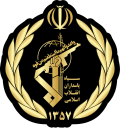Intelligence Organization of the Islamic Revolutionary Guard Corps
This article may require cleanup to meet Wikipedia's quality standards. The specific problem is: Article doesn't describe the organization itself. (June 2025) |
| Islamic Revolutionary Guard Corps |
|---|
 |
| Command |
|
Supreme Leader Commanders Joint Staff |
| Military branches |
|
Ground Forces Aerospace Force Navy Quds Force Basij |
| Intelligence agencies |
|
Intelligence Organization Intelligence Protection Organization |
| Personnel |
| Ranks insignia |
| Facilities |
|
Imam Hossein University Baqiyatallah University University of Command and Staff Amir Al-Momenin University |
Intelligence Organization of the Islamic Revolutionary Guard Corps (Persian: سازمان اطلاعات سپاه پاسداران انقلاب اسلامی) is an Iranian intelligence agency within the Islamic Revolutionary Guard Corps (IRGC) and part of Council for Intelligence Coordination.[1] The Intelligence Organization of the Islamic Revolutionary Guard Corps (IO-IRGC) was established on Khamenei's initiative in 2009.[2]
According to Stratfor, it is as powerful as the Ministry of Intelligence and possibly even more powerful than the other service. The agency appears to be more active at a domestic level while at an international level, the Quds Force is the key operational group. The agency also has a wide range of Basij informers.[3] It has been described as a "more ideological counterpart" to the Ministry of Intelligence, which it "overshadows" and "often" overrules, according to the New York Times.[4]
Description
[edit]The IO-IRGC is known for conducting internal surveillance, suppressing dissent, and maintaining a vast network of ideological informants.[5][6] Foundation for Defense of Democracies, a pro-Israel lobby group, alleges that the Commander of IRGC Intelligence is directly implicated in "surveilling and torturing dissidents".[7] According to Iran International, the IO‑IRGC systematically employs white torture and rape threats.[8][9]
As head of the intelligence organization, Kazemi was sanctioned by the U.S. Treasury in October 2022 and February 2025 for his actions.[10]
Senior officials
[edit]Deputy of IRGC Chief and Commander of the IO-IRGC:
- Hossein Taeb (2009–2022)
- Mohammad Kazemi X (2022–2025)[11]
- Deputy: Hassan Mohaqeq (2019–2025)[12]
- Majid Khademi (2025-Present)[13]
- Vice-Chairman: Mahdi Sayyari (from 2016)[12] [verification needed]
See also
[edit]References
[edit]- ^ Bahmani, Arash (25 October 2014). "Announced for the First Time: Iran Has 16 Intelligence Agencies". Rooz Online. Archived from the original on 1 December 2017. Retrieved February 27, 2015.
- ^ Wege, Carl Anthony (2015). "Iran's Intelligence Establishment" (PDF). Journal of U.S. Intelligence Studies. 21 (2): 66. Retrieved 15 December 2016.
- ^ Dumitrescu, Octavian (November 20, 2010). "The Intelligence and Security Services of Iran". Global Security. Retrieved October 15, 2015.[permanent dead link]
- ^ Tim Arango; James Risen; Farnaz Fassihi; Ronen Bergman; Murtaza Hussain (19 November 2019). "The Iran Cables: Secret Documents Show How Tehran Wields Power in Iraq". New York Times.
- ^ ""Like the Dead in Their Coffins: Torture, Detention, and the Crushing of Dissent in Iran: V. Detention Centers and Ill-Treatment". www.hrw.org. Retrieved 2025-06-24.
- ^ "Iranian Intelligence Community: An Overview". Grey Dynamics. Retrieved 2025-06-24.
- ^ Berman, Zachary (2025-06-19). "5 Oppressive Iranian Institutions Israel has Targeted". FDD. Retrieved 2025-06-24.
- ^ "Islamic Republic Uses Different Methods To Torture Protesters". www.iranintl.com. 2023-01-25. Retrieved 2025-06-24.
- ^ "White torture: A silent death - Iran HRM". 2025-05-15. Retrieved 2025-06-24.
- ^ "Treasury Sanctions Iranian Regime Officials Tied to Continued Violence Against Protestors". U.S. Department of the Treasury. 2025-02-08. Retrieved 2025-06-24.
- ^ "Gen. Mohammad Kazemi appointed new IRGC intelligence chief", Mehr News Agency, 23 June 2022, retrieved 23 June 2022
- ^ a b "سردار حسین نجات جانشین رئیس سازمان اطلاعات سپاه شد" (in Persian). Fars News Agency. 27 December 2016. Archived from the original on 30 December 2016. Retrieved 14 July 2017.
- ^ "General Khademi appointed as new chief of IRGC intel. org". Mehr News Agency. 20 June 2025. Retrieved 27 June 2025.

